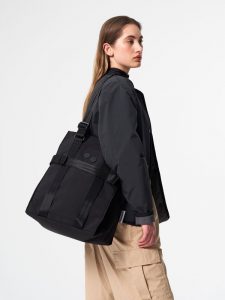 LUDWIGSHAFEN, Germany — July 3, 2023 — The new Pendik bicycle bag from the pinqponq brand by Germany-based baesiq GmbH has a significantly reduced carbon dioxide footprint thanks to BASF’s Ultramid® Ccycled® — a mass-balanced polyamide that supports the use of alternative raw materials from chemical recycling of plastic waste. BASF feeds pyrolysis oil from end-of-life tires at the start of the production in Ludwigshafen, replacing 100 percent of the fossil resources otherwise needed for the product. The proportion of recycled raw material is allocated to Ultramid Ccycled products using a certified mass balance approach.
LUDWIGSHAFEN, Germany — July 3, 2023 — The new Pendik bicycle bag from the pinqponq brand by Germany-based baesiq GmbH has a significantly reduced carbon dioxide footprint thanks to BASF’s Ultramid® Ccycled® — a mass-balanced polyamide that supports the use of alternative raw materials from chemical recycling of plastic waste. BASF feeds pyrolysis oil from end-of-life tires at the start of the production in Ludwigshafen, replacing 100 percent of the fossil resources otherwise needed for the product. The proportion of recycled raw material is allocated to Ultramid Ccycled products using a certified mass balance approach.
“With Ultramid Ccycled, we offer our customers a reduced CO2 footprint for their product with the same quality as the conventional counterpart. With our partner pinqponq, we are actively advancing the topic of circular economy and are also excited about the other bag collections that will be launched in fall,” said Frank Reil, head of Marketing and New Business Development & Sustainability Polyamides at BASF.
The materials used are innovative and functional, and importantly, sustainable. In summer 2023, pinqponq is expanding its range to include the bike product category, which is designed to simplify urban commuting. The Pendik model is a 2-in-1 bag with bike rack function. Its fabric, with Ultramid Ccycled, provides a fashionable matte look and a soft cotton-like feel, while retaining the robust performant benefits as of conventionally manufactured polyamide.
“We are very pleased to add the new highly functional product to our portfolio and, thanks to the cooperation with BASF, to be the first brand ever to produce functional bike bags from the sustainable polyamide. Our bike bags are a symbol of our vision to combine innovation and responsibility to create a sustainable future together,” said Holger Fabianski, Product manager at baesiq.
Posted July 4, 2023
Source: BASF




